LBJ Presidential library in Austin Texas
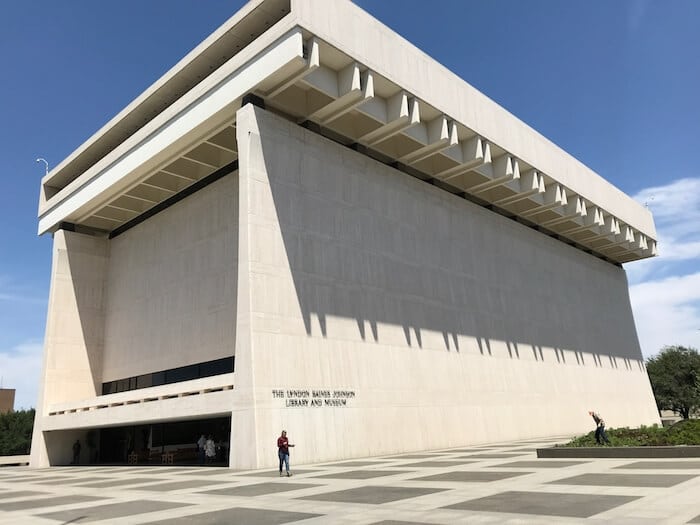
Lyndon Baines Johnson (LBJ) Presidential Library
I have always been interested in visiting a presidential library. While I was in Austin, Texas, I went to the LBJ Presidential Library. I was very familiar with President Johnson and thought I’d spend an hour wandering around the LBJ Presidential Library. I expected it to be a dry depiction of all of LBJ’s accomplishments. Boy, did I underestimate how interesting it would be and much time I would want to spend at the library. I could have easily spent most of the day.
LBJ: A Conflicting Legacy
LBJ is known for taking office after President John F. Kennedy was assassinated and massively increasing US involvement in the Vietnam War. During his presidency, the number of young men fighting in Vietnam increased to more than 500,000 and the Vietnam protest movement grew very large and loud. It became his lasting failure.
There is much more, however, to the Johnson Presidency. At the time of the assassination, most of Kennedy’s legislative initiatives had been stalled in congress, including the Civil Rights Act. The grassroots movement and the leadership of Rev. Dr. Martin Luther King, Jr. put immense pressure on LBJ to get the Civil Right Act passed. The Civil Rights Act was passed in 1964 and the Voting Rights Act in 1965 whileJohnson was President.
LBJ declared “the War on Poverty,” which has never been won and remains a pressing issue to this day. He initiated a significant amount of legislation to this end: Medicare, Medicaid, Head Start and VISTA. In addition, the National Endowment for the Arts (NEA), National Endowment for the Humanities (NEH) and the Public Broadcasting Service (PBS) were all established during his tenure. LBJ also supported gun control legislation (unusual for a southern Democrat). Finally, he had a hand in immigration reform and abolished the immigration quota that were set in the 1920s.
Kennedy-Johnson Ticket
LBJ had been a very powerful US senator prior to being Kennedy’s running mate. Here’s a photo of a piece of campaign literature that I’ve had for many years. It was paid for by the Alabama Democratic Party for the Kennedy-Johnson Ticket.
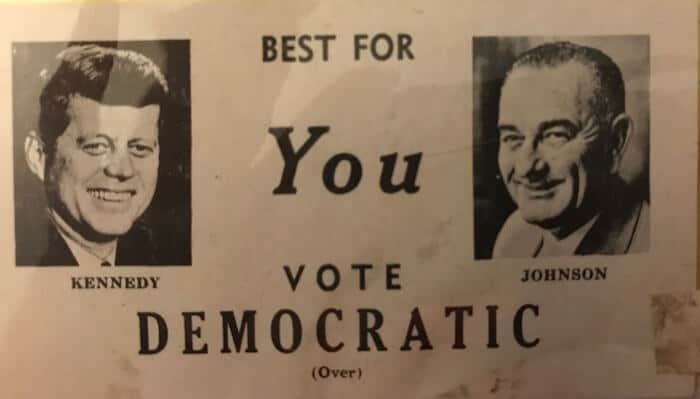
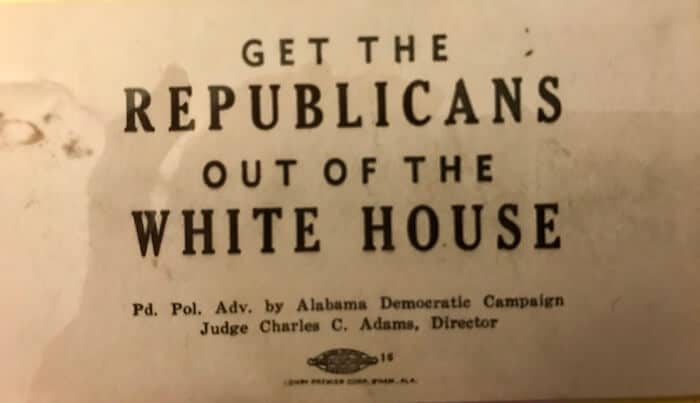
At the time of the 1960 election, Senator Johnson was the Senate Majority leader and had finished second in the primaries. JFK-LBJ narrowly defeated the Republican ticket headed by Richard Nixon with Henry Cabot Lodge for Vice President.
Kennedy Assassination
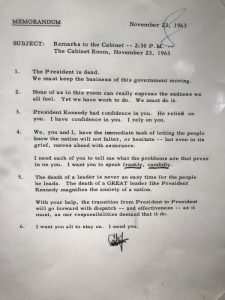
The LBJ Presidential Library deals in-depth with the assassination of Kennedy and Johnson’s rise to the presidency.This is a memo from Johnson displayed at the LBJ Presidential Library dated 11/23/1965–the day after JFK was assassinated. He had just become President and was beginning his work with the cabinet in a much different capacity.
At the time of the assassination, most of Kennedy’s legislative initiatives had been stalled in congress, including the Civil Rights Act.
The Library presents the passage of the Civil Rights Act as a result of LBJ leveraging the impact of the Kennedy assassination and his own relationships. In my opinion, this presentation underestimates the full impact of Dr. King and the Civil Rights movement. It also leaves out some of LBJ’s views on civil rights. Earlier in his career as a US Senator from Texas, he was well-known for espousing racist views and opposing anti-lynching and civil rights bills.
Secretly Recorded Phone Conversations
LBJ secretly recorded many of his phone conversations (he’s not the only President to do so) and those recordings were my favorite part of the LBJ Presidential Library. There are recording of conversations with Jaqueline Kennedy, Dr. King, Hubert Humphrey, Gerald Ford, Dwight Eisenhower, J. Edgar Hoover, Richard Nixon and many others.
In the conversations that I listened to, LBJ generally did 90% of the talking. The calls varied greatly. I listened to a recording of a call to Jackie Kennedy right after the JFK assassination. Then, another one to Congressman Adam Clayton Powell berating him for holding out his support for LBJ’s legislation. Another call with Martin Luther King Jr. discussing civil right legislation and inviting Dr. King for a visit next time he was in town. Later, in a 1964 conversation, Dr. King congratulates LBJ on his election and LBJ asks Dr. King for his help to work on poverty and helping young people.
Nonpartisanship & the Warren Commission
One the calls that most struck me was a call the LBJ did to Gerald Ford, asking him to serve on the so-to-be-named Warren commission investigating the assassination of JFK. In it, Johnson says:
“Gerald, I got something I want you to do for me…I’ve got to have a top blue ribbon presidential commission to investigate the assassination…I want it nonpartisan…where you forget what party you belong to and just serve as an American…”
This was a different era in US politics where the partisan divide was not as strong or vitriolic as it is today. I like the phrasing “forget what party you belong to.” We could use more of that in this hyper-partisan time.
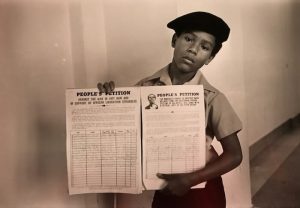
It is not that there was no partisanship in the 1960s and that everything was fine. Jim Crow laws and segregation, lynching, violence against African Americans and poverty were ever-present. The Vietnam war was a disaster. Many Southern Democrats opposed the Civil Rights legislation and an end to segregation. The country was very divided—the civil rights, anti-war, feminist and gay rights movements had started or were about to emerge.
In fact, right across the courtyard, there was an exhibit at the Briscoe Center called the Struggle for Justice Exhibition: Four Decades of Civil Rights Photography. This photo of the Black Panther’s Peoples Petition is from that exhibition.
In the legislative process, however, it was more possible to work across the aisles. More could get done. You can see that by looking at the amount of legislation that LBJ signed into law.
Other Exhibits
President Johnson’s, limousine is one of the first things you see when you walk into the museum. I also enjoyed seeing some of the correspondence between LBJ and Lady Bird Johnson. The replication of the oval office and of Lady Bird’s office and the political cartoons about LBJ were interesting as well. You can also see the teletype machine that was used to communicate with the Soviet Union leadership.
The LBJ Presidential Library is certainly worth a visit and is an important look at a very turbulent time in US history. The opportunity to listen to conversation and read memos and materials was a great experience.
Visiting the LBJ Presidential Library
The LBJ Presidential Library is located on the University of Texas Austin Campus. It was a short Uber ride from our hotel, though the driver wasn’t exactly sure what entrance to take. UT at Austin is a huge campus. The library is open every day from 9-5. Admission is $10 for adults, $3 for college students and children.
For More things to do in Austin, read this post on Graffiti Park.
Interested in learning more about US Presidents? Check out Spend an Hour with America’s Presidents at the Smithsonian National Portrait Gallery
You might also like to read this post on Washington, DC.

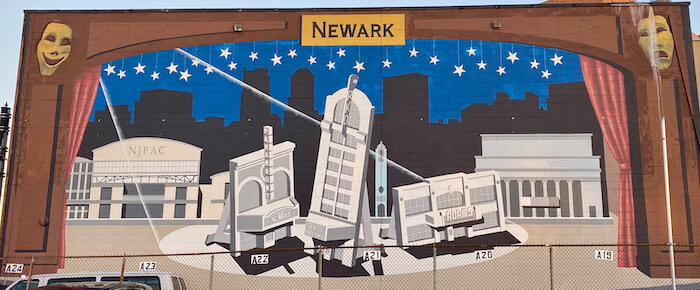
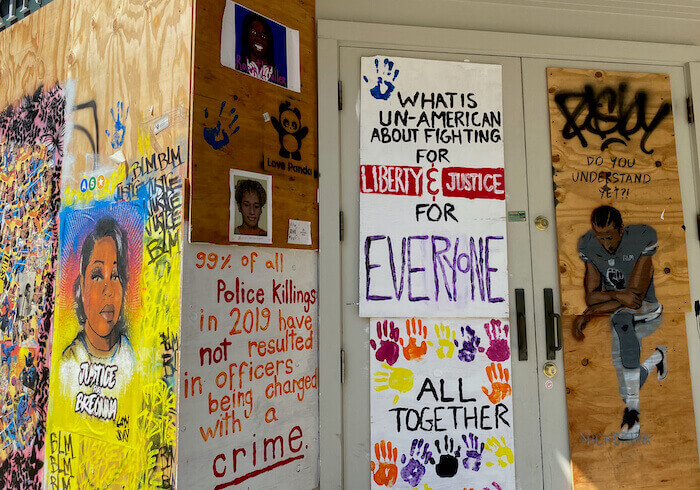
Thanks for the share! Ive never actually been to Austin, but hoping to visit one day. This sounds like a great trip!
It was! Thanks!
Wow such an interesting read, thanks so much for sharing!
Thanks for reading and commenting.
This is so interesting! The library looks more like a museum- I am a museum buff, so will definitely visit!
Thanks!
I’ve always been very interested in the whole JFK era. Sounds like you learnt a lot! Thanks for sharing.
Thanks. It was very interesting
Is it really a library or a museum? Why are they charging $10? Thanks for sharing this. $10 is too much for Ime..I guess I’m either cheap or not just a fan of politics.
Presidential libraries are museums and libraries at the same time. And it does cost $10 to get in.
I’m not into American history at all, but I would be VERY interested in visiting this fantastic example of Brutalist architecture (my favorite style!). What a beautiful block of concrete!
Most people don’t know about brutalist. Are you into architecture?
I’ve been to Austin multiple times, but never thought of stopping by this library. Pretty impressive exhibit for history buff!
Yes. Really worth a visit
I’d have never imagined that a library could have been a point of attraction but boy was I wrong. You seem to be really passionate about your day there and I can tell that it has left an impression on you. Too bad there’s no pictures of the interior, but nothing that google can’t fix (I hope)!
The replica from the Oval Office is from the inside and I am sure you can find more on ggogle
What a great historical site! My husband, the history buff, would love to take a visit here. Everything truly looks so interesting.
Thanks. Definitely make sure to leave enough time
I loved Austin! Had no idea this was located there. Need to check it out next time I’m in town!
That’s a fascinating read. I love that he recorded his calls, but did 90% of the talking. It must have been like a diary to him. Interesting about the non-partisan work too, something we could definitely do with more of on both sides of the pond.
It’s fascinating that you can listen to those old phone calls.I’m sure it also feels a little weird, knowing the others didn’t know they were being recorded.
It was interesting. I wonder how many were concerned when they found out they were recorded.
Yes! I love Austin. As a Dallasite, I’ve been one too many times (and am still excited for my next trip). I’ve never visited the LBJ Library but I absolutely will on my next trip! I love how detailed this post is. I didn’t know that LBJ secretly recorded many of his phone conversations and I would love to take a look at the recordings some day! Is it $3 for all college students or just UT Austin students?
I think for all college students as long as you have a college id
This seems like a fascinating place to visit. I’m very interested in this era in American history and would love to delve into the secretly recorded phone conversations. If I ever make it to Austin, I’ll be sure to head here!
I’ve never been to a presidential library, but it looks very interesting! Don’t think we have any of those here in the NL.
Thanks!
Thanks for sharing! This sounds like an awesome trip! We have never been there, but it’s on our list.
Thanks!
Wow, I’d really love to visit! So much well-researched points here, well done!
Thanks!
The LBJ library is closed due to the government shutdown.
Thanks. Hopefully not for too much longer.